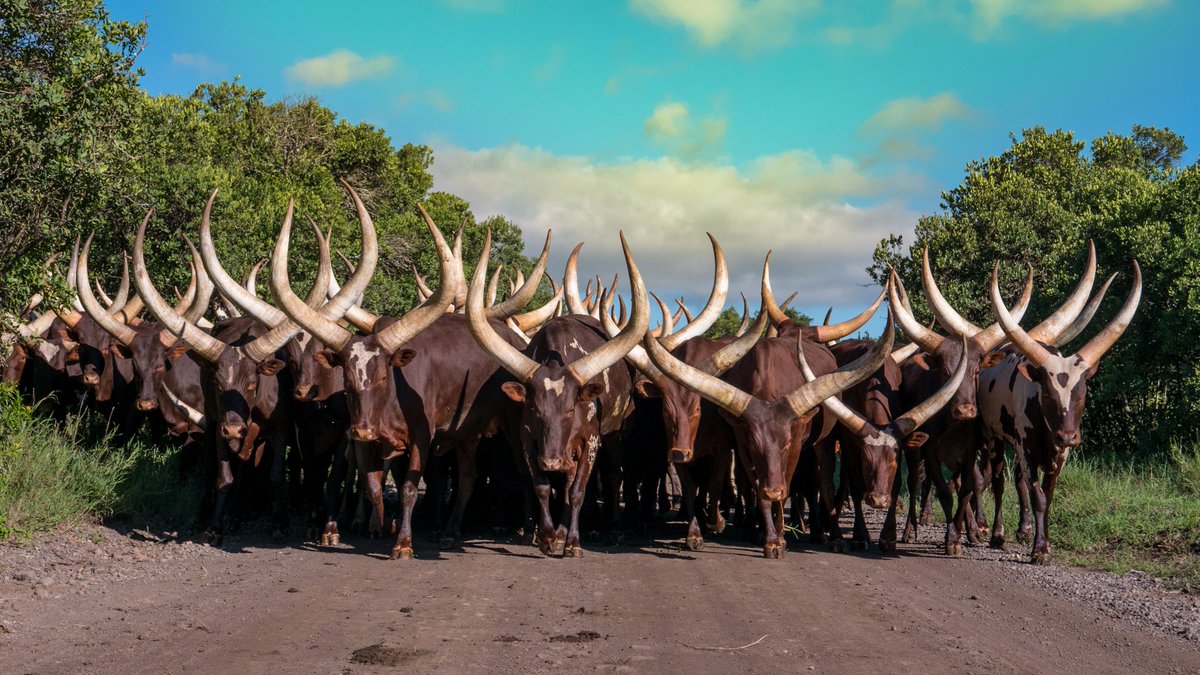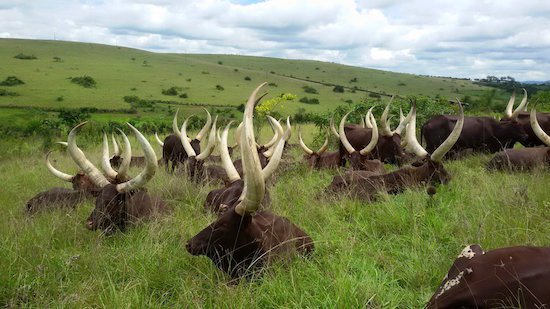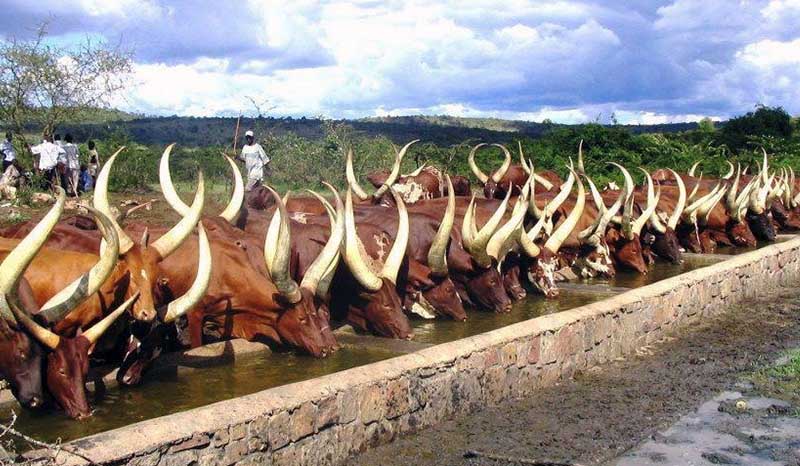By Sibasi Timothy, Feature Writer based in Kampala, Uganda
The Ankole Long Horned Cows are at the precipice of extinction in Uganda, even though the breed is listed as heritage assets that the contemporary man has inherited from legendary ancestors.

The threat of extinction has been precipitated with the globalization and technology of artificial insemination, which local herdsmen have started to embrace after learning that people with Friesians are earning more money.
It's believed that long horned Ankole cattle were left behind by the Bachwezi who were semi-gods that inhabited parts of inter-lacustrine region around the 14th Century, the long horned Ankole cows are known for their remarkable beauty and distinctiveness from other species of cattle that are spread worldwide.
They are a drought and disease resistant cattle breed, thriving in the dry lands of Ankole and Masaka. They have their unique features, such as the pattern of its horns -- some have straight horns, while others with curved ones or spread apart; also the color of their body -- some have pure colors, while others have dotted ones. In addition, their friendly nature to humans and amazing sounds make them deserve better conservation.
Not too optimistic current living situation
In 2005, the Food and Agriculture Organization reported that at least 20% of the world's estimated 7,600 livestock breeds, among them the Ankole cow, were in danger of extinction. The agency warned of a potential "meltdown."
In 2008, the World Bank also published a report, saying it was time to place farming at the center of development. Highly productive livestock breeds, the World Bank asserts, can alleviate poverty. "We do not have disease-resistant local breeds," said Chris Delgado, agriculture policy adviser at World Bank. He said this has made people lose interest in local breeds, a trend that is worrying many scientists.
"It is about survival. If there is anyone still keeping the Ankole cows it is because of prestige, but not because of milk or commercial benefits," said Allan Turyagumanawe, herdsman in Luwero District.
The exotic breed, or Friesian, is becoming a darling to many cattle keepers, and those who have small pieces of land opt to do away with the long horned Ankole cows to provide space for high quantity milk producing exotic cows. People with vast land are still holding on to the grip to conserve the Long horned Ankole cattle breed.
The impact of extinction can be witnessed while on tour in Uganda, since most farms along tourist routes contain the exotic ones compared to indigenous long horned Ankole cows.
Exacerbating factor
According to a report by the Pastoral and Environmental Network in the Horn of Africa (PENHA), indiscriminate cross-breeding of Ankole long-horned cattle with different exotic cattle has harmed the species. People worry there might be no more indigenous breed of long horned Ankole cows.
In the short term, the exotic and hybrids are commercially and economically very successful, because they are grazed on smaller pieces of land, produce plenty of milk and meat and generate higher income. However the exotics are very vulnerable to the harsh environment and the management costs are very high as the exotics need special fodder and care. Accordingly in the long term, they are not as commercially viable as they appear.
The report also reveals that it's dangerous to lose Ankole long horn cattle, which have well adapted to harsh conditions in dry areas. They carry valuable genes that would be lost if the breed becomes extinct and yet these genes are an important asset in light of climate change, food security and changing needs.

Ankole long horned cows at the farm resting. (Photo/ Sibasi Timothy)
Due to several changes, including increased population, a lot of grazing range land has been cultivated and some of it gazetted for wild life conservation and this has complicated the life of pastoralists they no longer have unrestricted access to wide areas of grazing land. Therefore, Ankole cattle keeping pastoral communities have resorted to selling off a significant portion of their herds of indigenous cows, and clearing bush land, so they can graze smaller herds of exotic breeds and hybrids, which can be managed on a small acreage and yet produce more milk.
Some good news
Dr. Nicholas Kauta, commissioner in charge of livestock in Uganda, believes Ankole cattle would not become extinct. He argues that even if farmers abandon the local breed, veterinarians will preserve it in a gene bank.
The Entebbe-based National Animal Genetic Resource Centre and Data Bank has been storing sperms from bulls of the Ankole breed for breeding purposes.
Also, the Ankole long-horned cow is better adapted to semi-arid conditions. According to Carlos Ser, the Director General of the International Livestock Research Institute, the reliance on exotic animal breeds poses a high risk because they cannot cope with unpredictable fluctuations in the environment or disease outbreaks when introduced in some developing countries such as Uganda.
Information available on the website of the Pastoral Environmental Network in the horn of Africa also maintains that Ankole cows can endure seasonal movement and do not require expensive investments in water points and veterinary care -- making it the backbone of the pastoral economy.

Long Horned Ankole cows at the farm taking water after grazing. (Photo/ Sibasi Timothy)
In the FAO report, scientists pointed out that during long drought spells, some farmers that keep their hardy Ankole breeds can walk long distances to water sources, while those who had traded Ankole for imported breeds lost their entire herds.
Strong tradition could help
The conservation of Ankole is beyond mere conservation. It is an ancestral role that must be adhered to. They have flowed down the chain with the descendants of their owners. You find a family having a cow whose ancestors have been in the family for around 90 years. That it’s an offspring of this, which was born of the other, so on up to the initial origin.
This literary means that the owner had a favorite lineage of a particular cow either because of its beauty, its relation to tradition, milk production or its origin; he would then pass it to the son who he knew would preserve it and the flow could be like that. Selling such Ankole was abominable and when it died, it would not be eaten but would be buried like a human being. This was an ancestral role and contributed much to Ankole long horned cow conservation.
(The opinions expressed here do not necessarily reflect the opinions of Panview or CCTV.com. )

Panview offers a new window of understanding the world as well as China through the views, opinions, and analysis of experts. We also welcome outside submissions, so feel free to send in your own editorials to "globalopinion@vip.cntv.cn" for consideration.
















